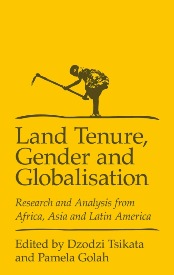Resource information
Drawing from field research in Cameroon, Ghana, Viet Nam, and the Amazon forests of Brazil, Bolivia, and Peru, this book explores the relationship between gender and land, revealing the workings of global capital and of people’s responses to it.
A central theme is the people’s resistance to global forces, frequently through an insistence on the uniqueness of their livelihoods. For instance, in the Amazon, the focus is on the social movements that have emerged in the context of struggles over land rights concerning the extraction of Brazil nuts and babaçu kernels in an increasingly globalized market. In Viet Nam, the process of “de-collectivizing” rights to land is examined with a view to understanding how gender and other social differences are reworked in a market economy.
The book addresses a gap in the literature on land tenure and gender in developing countries. It raises new questions about the process of globalization, particularly about who the actors are (local people, the state, NGOs, multinational companies) and the shifting relations amongst them. The book also challenges the very concepts of gender, land, and globalization.
5. The Politics of Gender, Land and Compensation in Communities Traversed by the Chad-Cameroon Oil Pipeline Project in Cameroon. Joyce B.M. Endeley
8. Conclusion: For a Politics of Difference. Noemi Miyasaka Porro
Pamela Golah worked as a Program Officer with the Women's Rights and Citizenship Program at the International Development Research Centre, Canada. In 2009, she joined the Research and Evaluation Branch at Citizenship and Immigration Canada as a Policy and Research Analyst.


